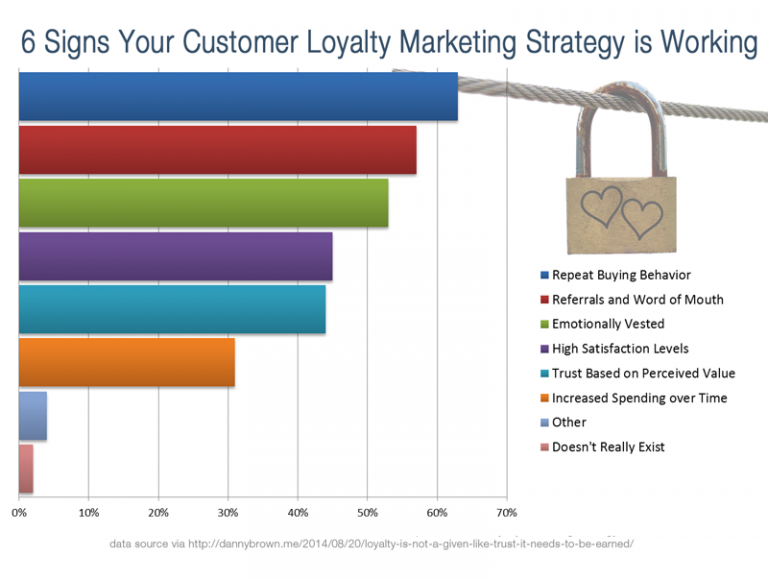Businesses that earn customer loyalty have a much easier road to sustainability and profitability. Here are six customer loyalty signals that can tell you you’re on the right path.
6 Customer Loyalty Signals that Show Your Strategy is Working
Brands that earn customer loyalty reap the benefits in repeat purchases, referrals and more. Earning loyalty is easier said than done, and once won can still be lost – but it’s worth it! Here some loyalty marketing strategies that can help you identify customer loyalty signals when you see them in your business.
It’s possible that lot of the marketing effort and resources that get invested on customer acquisition efforts could be saved if brands would focus more on customer retention and loyalty and learned to spot the customer loyalty signals that prove ROI. While retention is one marker of customer loyalty, it’s no guarantee that your customer loyalty marketing strategy is actually doing the job. Here are six customer loyalty signals you should be looking for as proof that your loyalty marketing plan is working.

You might also like: 8 Baselines for Meeting Customer Expectations
6 Customer Loyalty Signals You Should Be Looking For
63% – Customer Comes Back to Buy Again, Subscribes, or Signs on to a Long Term Contract
When clients sign on for the long term or come back to buy on a regular basis it’s a pretty good sign that your products or services are meeting their needs. While this is the top marker of customer loyalty, it’s important to remember that repeat buying is not necessarily a signal of customer loyalty, it could simply be a signal that customers haven’t found a better option. If they do, minus real brand affinity and a sense of loyalty, chances are they will jump ship. When looking at repeat buying and retention, best to consider this as a marker of customer loyalty only when other signals are also present.
57% – Customer Refers Friends and Colleagues to the Business
Repeat buying behavior accompanied by referrals are a clear sign that your customer feels like they have found a good thing and want everyone to know about it. Even though loyalty implies a relationship over the long term, don’t forget that new customers might actually be most enthusiastic about recommending your business to their friends and colleagues at the beginning of your relationship, when they first realize how awesome your business is, and make sure that your loyalty marketing strategy encourages referrals at every phase of the customer life cycle.
Review sites and social networks make it possible for customers to refer total strangers as well as friends, family or colleagues to your business. As you consider referral rewards or incentives, don’t overlook the value of social proof in creating word of mouth referrals.
53% – Customer is Emotionally Invested in the Relationship
The word ‘loyalty’ itself is invested with emotional connotations, which is one reason why repeat buying behaviors alone may not be indicative of true customer loyalty: Loyalty; noun, a strong feeling of support or allegiance. When people are loyal to you, you can trust them to have your back. They will give you the benefit of the doubt if something goes wrong. They will give you second chances. They will defend you; they may even fight for you.
The fact is, the things we spend most of our time focused on when it comes to marketing (e.g., pricings, features and benefits) don’t inspire this type of emotional connection. Loyalty marketing strategies must speak to the customer experience and look for ways to create emotional connections based on things that really matter to people, like vision, values, causes, and guiding principles.
45% – Customers are Highly Satisfied
When was the last time you actually took some type of measurement when it comes to levels of customer satisfaction? Businesses that are serious about customer loyalty marketing must be obsessed with customer satisfaction, and they must find ways to measure and track it over time, with the launch of new programs and products, with the implementation of changes to the customer experience, and so on.
44% – Customers Perceive They Are Getting a High Value
When customers perceive they are receiving a high value in return for their investment, it’s not just about price. All wrapped up in this concept is the idea that you could be charging more but you aren’t because you care about the customer as much—or more—as you do making a buck.
Not only does this perception stimulate repeat buying behavior and referrals, it also encourages emotional investment. Customers that perceive they are receiving a high value from your business are much more likely to feel a vested interest in keeping your business in business and helping to make it profitable, so that they can keep on receiving the high value they perceive you provide.
31% – Customers Spend More Over Time
When customers don’t just come back to buy from you on a regular basis but also increase the number of items, services or upgrade to more expensive options, it’s a good indication that you have laid the foundation for loyalty. In particular, it may speak to the trust they have in your business because of the value they perceive as well as their satisfaction with the relationship so far.
As customers demonstrate an interest in deepening their relationship with your business by purchasing more items, more expensive items or items they haven’t purchased from your business before, take the time to reach out with questions about the customer experience, a customer satisfaction survey, and incentives that could encourage them to refer friends or colleagues to your business.
***
Tying customer loyalty programs to the point of sale increases your ability to get customers to come back more often, spend more on impulse purchases and get more referrals and reviews. Ask us about POS software that enables you to manage your customer loyalty program seamlessly, trigger automated marketing and strengthen your relationships with customers:

